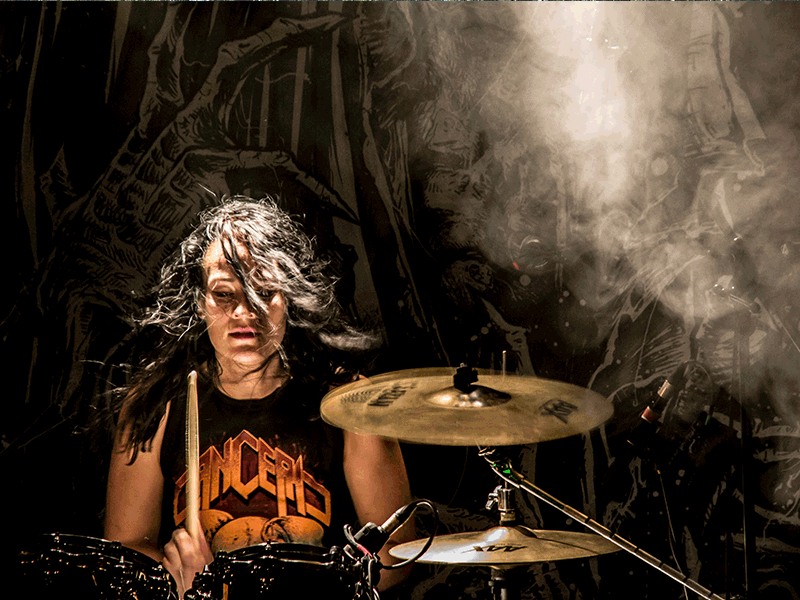Last July, Samantha Landa got a Facebook message asking if she wanted to go on a North American tour with an all-female thrash metal band from Brazil that she’d recently discovered and admired.
Landa was thrilled. The catch, however, was that she had to be willing to leave for the month-long tour in a week as the band, Nervosa, had just had a drummer quit on them. A mutual friend had recommended Landa, who lives in Vancouver and plays with local melodic death/thrash metal band Dead Asylum, as a temporary replacement.
“I told myself, ‘I’m going to spend the next 24 hours learning some of their songs. If I can get three or four down, I’ll say yes. I didn’t want to say yes and then drop the ball,” Landa, 29, said.
She met her goal, and the band sent her a plane ticket to Montreal.
The other members of her band, Dead Asylum, was immensely supportive, telling her they’d also take the offer if they were in her shoes.
Before embarking on a series of shows across Eastern Canada and the United States, Landa noted, “We were able to squeeze in one, one-hour rehearsal together before our first gig in Quebec City.”
By the time the tour had ended, Nervosa had asked Landa to join them on their upcoming European tour, for which they’d be departing in several weeks.
Again, she said yes. Nervosa covered a large swath of Europe, touring 18 countries in five-and- a-half weeks.
“It was my first time touring at this level, supported by labels,” she said. “The metal scene is much bigger in Europe. A lot of the sub-genres there have originated and grown in Europe. Some of the more extreme sub-genres of metal are also better received in Europe. The shows are bigger, more people come, there’s usually more money.”
While she had an incredible time on tour and became extremely close with Nervosa’s members, Landa said logistically speaking, it would be difficult for her to join the band permanently.
“It’s much harder to have a member who’s 18 hours away. They’re looking for a permanent member, so someone who’s Brazilian [makes most sense],” she said.
Landa, who was raised in Richmond, B.C., attended Hebrew school twice a week until her bat mitzvah. She started out playing classical piano, and at 11, she and her mom went to an information session about joining her elementary school’s concert band.
She was told her options were bass, drums, clarinet, the French horn and the saxophone.
“I guess I was a bit full of myself,” Landa chuckled. “I was like, ‘Which one’s the hardest to learn?’”
The teacher told her it was either drums or the French horn. Because her school owned a drum kit, choosing drums meant her parents wouldn’t have to pay for the monthly rental of a French horn, Landa explained.
“My mom said, ‘You have to promise you’re not going to ask for your own drum kit at home,’” Landa recalled.
She did, of course, eventually get a kit, which she kept in the garage, but it was her grandparents who eventually bought it for her.
Initially into alternative rock and punk rock, Landa eventually discovered metal and was drawn to it, at first largely because the rhythm was faster, more complex.
“I wanted something more challenging, more complicated, and faster. I didn’t want to play rock beats forever,” Landa said.
Landa has had to contend with some of the challenges of being a woman in a male-dominated music scene.
However, she said she’s started to see “more girls playing guitar and bass than I used to, which is great, and I’m starting to meet more female drummers. I think the media are doing a better job now of representing women [in metal]. It’s no longer just Revolver [magazine]’s ‘Hottest Chicks in Metal.’”
Of course, sexism isn’t a non-issue.
“When I say I’m in a band people immediately go, ‘Oh, are you the vocalist?’ They don’t ask me what instrument I play,” Landa said.
The metal scene, generally, is often beset with misconceptions, presumed by outsiders to be full of Satan-worshippers or, as Landa put it, “scumbags…people who are scary, or bikers.”
In reality, she said, the scene is notable for how warm and welcoming its fans are.
“Metal heads are some of the nicest, sweetest, most caring people. They’re very accepting and quite positive. I think a lot of us use metal as a way to let out negative energy and aggression,” she said. “It’s a lot of friendly people who just love getting out their energy on a mosh pit.”
